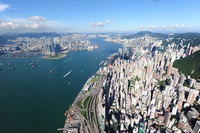 |
| No.1 February, 2014 |
|
| |
|
| |
Australia and Hong Kong partners in regional economic development |
|
| |
|
|
| |
Article by Michael Spence, Vice-Chancellor and Principal of the University of Sydney and Kerry Brown, Director of the China Studies Center at the University of Sydney. |
|
| |
|
|
| |
 On the surface Hong Kong and Australia are very different. The economy of Hong Kong is overwhelmingly reliant on services; Australia’s is dependent on commodity exports. While Hong Kong has delivered one of the world’s best per capita GDP levels on the back of its finance role in the last two decades, Australia has grown rich on exploiting its vast natural resources. On the surface Hong Kong and Australia are very different. The economy of Hong Kong is overwhelmingly reliant on services; Australia’s is dependent on commodity exports. While Hong Kong has delivered one of the world’s best per capita GDP levels on the back of its finance role in the last two decades, Australia has grown rich on exploiting its vast natural resources.
Hong Kong and Australia have one thing in common, however, and that is for both, their key economic relationship is with the Chinese mainland. As a special administrative region, Hong Kong operates its own fiscal policy and has its own currency. Hong Kong is the destination of almost two-thirds of mainland outward investment and the place where a large quantity of goods from the mainland are transshipped. It still operates as an important interface between the mainland economy and the rest of the world. Australia is the place where an increasing amount of that investment ends up. In the last decade, from almost nothing, Chinese investment has risen to becoming, in 2012, the third largest in that year. While still aggregately small, it is almost certain that in the years ahead the Chinese mainland will become one of the main, if not the most dominant, investors in Australia, and Hong Kong will act as the crucial intermediary in this.
|
|
| |
|
|
| |
The close relationship of both the Hong Kong and Australian economy to the mainland means that there needs to be more diverse dialogue between each place. There are good strategic reasons for doing this. In terms of crude trade figures, over the last five years there has been only modest growth of 1 percent per year. But in the import and export of services, the rises have been more noticeable, with a 5-10 percent rise over this period bilaterally. That is a trend that Australia needs to welcome. If there is one area of shared challenge that Hong Kong and Australia have with their largest trade partner, the mainland, it is how to become providers of services into the mainland market, with its huge potential for growth. This is why Australia needs to concentrate more on the opportunities that Hong Kong offers as a place from which to achieve this.
One of the most important services that Australia offers the region and the broader world is education. This offers a natural place for us to concentrate our energies at the moment. In the last decade, tens of thousands of mainland students have come to Australia to study. Education is hugely important not just for economic but also for political and cultural reasons. It deepens the links between countries, and creates a more profound commitment between them. Hong Kong student numbers have fallen in Australia in the last decade. But in many ways this is simply a sign that our relationship has changed and reconfigured in this area. Hong Kong universities have long established collaborations in Australia, and strong research links. So while student numbers have declined, the ways in which we collaborate intellectually in science and the humanities has strengthened. This is something that has to be preserved and nurtured.
Hong Kong and Australia have one final commonality. They both exist in the world’s most dynamic region, but also the most competitive. As economies, they are both reliant on one core asset — their people. Australia’s good fortune in commodities and natural resources won’t last forever. It needs a stronger service base, and indeed in the largest of the state economies, New South Wales, services are already almost half of GDP. Some 90 percent of Hong Kong’s economy is in tertiary services. So as service partners, their two economies have great synergies. And of course, in this area, education is the key. So Australia must think more about Hong Kong as a partner in their regional economic development plans, and Hong Kong needs to think of Australia in the same way. We have a lot in common.
This article first appeared in China Daily (“China Daily” links to:
http://www.chinadailyasia.com/opinion/2014-03/10/content_15123758.html) and is reproduced with permission from the authors. |
|
| |
|
|
|
| |
 |
|
|
| |
|
|
|
| |
|
|
|
|
 |

